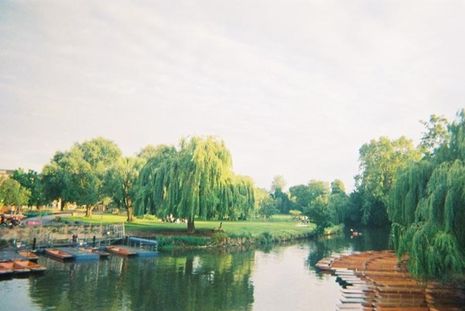How to complete Cambridge: a first, a blue, or a spouse?
Do you really need a first, a blue, or a spouse to say you’ve completed Cambridge?

The University of Cambridge: a historic, bold, and formidable institution. With Cambridge comes various features: the Trinity porters with their bowler hats, the gowns, the eloquent formals with the loud gongs, the numerous accomplished guests visiting the Cambridge Union weekly, the near certainty that you will encounter someone you know in Pret or on King’s Parade at some point. For each of us, there may also be special locations or those that we consistently frequent. The top of Castle Mound, Grantchester Meadows, the riverside by Magdalene Bridge, the Revs terrace, the Squire law library, and more. Amongst the most well-known traditions and places, there are also experiences missed in brochures of the ‘Cambridge experience’, that students here will remember fondly.
For several current undergraduates, our university experiences commenced in the depths of the COVID-19 pandemic, the supposedly quintessential Cambridge traditions such as formals or May Balls remaining but a mystery until recently. Despite these circumstances, there seems to be a culture, or at least a series of Cambridge traditions, which have casually pervaded through to the present day. The satellite college cultures no doubt make a difference, and it is difficult to deny that, in some sense, each college does not have a distinct culture, perhaps rooted in its history, or otherwise. There are different ways you could categorise colleges: the ones that allow you to walk on the grass and the ones that don’t, or more generally, whether a college is insular or outgoing.
Much is peculiar about studying at Cambridge, the clock chimes differently here (no — not the Corpus Clock). People go out on a Wednesday, or a Thursday, or even a Sunday, but a Saturday? If you’re looking for a gown you might be better off going home, you might even hear a penny drop on the way. The calendar’s quirky, you’ve got more formal, widespread events like Matriculation, and then you’ve got informal widespread goings-on like C-Sunday on Jesus Green Common. Where some might pursue The Pitt Club or Hawks’ Club as a place for camaraderie, for others, the events held by cultural societies hold high importance for a sense of community, whether it’s Bollywood or hip-hop music nights. To add to the mix, there’s a saying, you either leave Cambridge with a First (class degree), a Blue (in sport), or a spouse (an actual one — not a ‘college spouse’). No doubt, some will, whilst some might leave with something completely different, but equally meaningful and valuable.
For a fair few, completing the Formals Challenge might be the accomplishment they hold dearest when reflecting on their university time, perhaps with token menus in their personal archives and flamboyant memories of ‘pennying’ a friend (dropping a penny in a friend’s dessert at a formal, meaning that as a forfeit, the friend must finish the dessert without using their hands). Comparatively, others may not hold their experience at this university in the highest esteem possible, owing to these same obscure traditions. Yet, there will be some, who, when they hear Sweet Caroline, will feel a sense of nostalgia about the sticky floors of Cambridge nights-out (the long queues and paper tickets prior, and the seemingly obligatory Gardies or the Van/Trailer of Life food visit afterwards).
There is no doubt that where some may spend more time developing their academic faculty of reasoning in a library for continuous hours, others will opt instead to dedicate their time in the department of love to a sport or love to another person.
The three pillars of ‘First, Blue, or Spouse’, though commendable if achieved, are not the tenets by which every student will measure (or should measure) their own university experiences
Like a duck to water, a Cambridge student and success through academic pursuit, is often seen as a clearly defined relationship. To an extent, this is understandable, but in a greater context, the ‘Cambridge experience’ is different for every student. I’ve met people who have come here with different ambitions, bustled through Cambridge’s smaller sub-cultures, and left with different goals. Would it not make more sense to measure an aspiring comedian against their success in making an audience laugh at the Edinburgh Fringe, more perhaps than the barometers of a ‘First, Blue, or Spouse’? Some students choose to venture into theatre life at the ADC, whilst others complete research work in laboratories, and others retreat into the enclaves of the Cambridge Union ‘hacking’ (fervent campaigning) chamber, and more enjoy a picnic by Coe Fen with friends.
Of course, ‘imposter syndrome’ isn’t a phrase uncommon amongst students, in the context of studying at Cambridge. Cambridge is, in itself, enough. The three pillars of ‘First, Blue, or Spouse’, though commendable if achieved, are not the tenets by which every student will measure (or should measure) their own university experiences. It might not be breaking news that Cambridge can be a fast-paced environment but, if you do achieve all three, feel free to share your secrets.
 Features / Meet the Cambridge students whose names live up to their degree9 September 2025
Features / Meet the Cambridge students whose names live up to their degree9 September 2025 News / Student group condemns Biomedical Campus for ‘endorsing pseudoscience’10 September 2025
News / Student group condemns Biomedical Campus for ‘endorsing pseudoscience’10 September 2025 News / Tompkins Table 2025: Trinity widens gap on Christ’s19 August 2025
News / Tompkins Table 2025: Trinity widens gap on Christ’s19 August 2025 News / New left-wing student society claims Corbyn support11 September 2025
News / New left-wing student society claims Corbyn support11 September 2025 Science / Who gets to stay cool in Cambridge?7 September 2025
Science / Who gets to stay cool in Cambridge?7 September 2025









